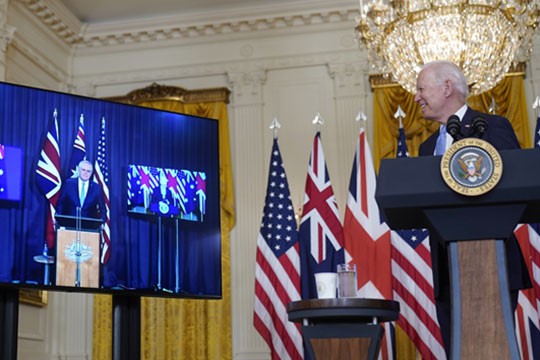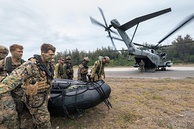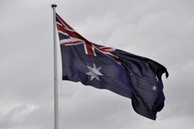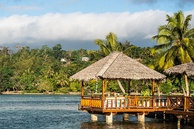Picture: news.cgtn.com
The leaders of the United States, the UK, and Australia — Joe Biden, Boris Johnson, and Scott Morrison — made a joint statement on deepening defenсe and technological ties in the dual space of the Indian and Pacific Oceans. The parties have established a trilateral security partnership — AUKUS. As part of this agreement, the United States will transfer nuclear submarine technology to Australia. The Fifth Continent will join the club of countries with a nuclear submarine fleet on a par with the United States, Great Britain, China, France, Russia, and India but that might be a while. Despite the attempts of the Anglosphere to indicate that AUKUS is not directed against any country, their actions demonstrate the opposite and are linked with aggravation of Sino-US rivalry.
Artyom Garin, Research Associate of the Center for Southeast Asia, Australia and Oceania of the Institute of Oriental Studies of the RAS, told us about the key features of AUKUS. The interview was conducted by international journalist Elizaveta Antonova.
Why has the transfer of nuclear technologies within the framework of AUKUS attracted such attention? What power is this agreement directed against?
The establishment of another agreement, the abbreviation of which is combined with ANZUS, ANZUK, etc. brings us back to the times of the Cold War — for someone romantic, for someone tragic. At that time, Australia was on a par with its «great and powerful friends». However, more than half a century has passed since then, generations have changed, the world itself has changed: China is coming on the first positions, the UK is no longer an empire or even part of European integration initiatives, Australia was taking small steps towards comparative independence, and the United States is gradually losing its influence in the world, including in Asia. As we can see, in the context of the aggravation of the Sino-US rivalry, the Anglosphere again appeals to the usual mechanisms of building the balance of power.
Anyway, it’s worth highlighting several main features of AUKUS. Firstly, the transfer of nuclear submarine technology demonstrates the United States needs to show commitment to its allies and loyalty after fleeing Afghanistan. Logically, the withdrawal of the US troops made many experts and politicians think, can the United States escape from Asia as they escaped from Afghanistan? So far, everything is going to the fact that Washington is really conducting a control check and focusing on the Asian direction.
Secondly, AUKUS is clearly anti-Chinese in its nature. Now Australia may have submarines with a higher speed, the ability to stay underwater longer, operate over a larger geographical radius and even carry nuclear weapons. This poses a completely different and more ambitious defence challenge for Canberra. Undoubtedly, Australia was pushed to rearm by the high pace of military building in China. It has been repeatedly said that the South China Sea (SCS) may become the main theater of operations for new Australian submarines. However, in this interview, I'd like to draw attention to the potential links between the SCS and the Southern Africa, which can become a region of interest for the Quad countries. Given China's strong position in the South China Sea and the controversial possibility of the United States competing with China in the Pacific, Washington and its allies will try to ensure control over the maritime logistics routes passing through the Cape of Good Hope and Indian Ocean. Russia's interests are present in this area, so this region cannot be ignored.
At last, AUKUS will bring both benefits and costs to Australia. Canberra again sharply opposed itself to China (with which other Asian countries haven't such strained relations), showed that it can use contractual gates at the last moment, return nuclear technologies to the South Pacific Nuclear-Free Zone (SPNFZ). In addition, the Fifth Continent will pay for submarines and technology not only financially, but also with its sovereignty in decision-making processes, risking being drawn into a conflict between the United States and China if it arises. One way or another, Australia will not be able to compete with China in both the economic and military spheres. The only thing it can believe is to cause as much damage during the possible conflict. However, China will not conduct military operations in the South Pacific but will expand through trade and investment.
Australia's cancellation of a multibillion-dollar agreement with France for the construction of submarines caused an extremely negative reaction in Paris. How will the actions of the Fifth Continent affect its relations with France and the European Union?
Australia's breaking the treaty with France has dealt a strong blow to bilateral relations and, in general, relations with the European Union. This step has broken the trust. However, it should be noted that the French submarine project was really too expensive and, in some way, Australia was lucky to abandon these agreements.
Scandals about submarines in Australia are not a new phenomenon. Back in 2013-2015, during the years of Tony Abbott's premiership, Canberra decided to purchase Japanese submarines to replace the outdated Collins-class submarines. Given the fact that Australia and Japan have been negotiating the FTA for almost nine years, and with Tony Abbott, the FTA was successfully completed, it was suggested that the signing of the agreement was based on a mutual concession for the purchase of Japanese submarines. Moreover, LPA members in South Australia were also critical of this deal, as it could lead to the loss of jobs in the Australian Submarine Corporation — the state corporation of Australia engaged in the construction of submarines, based in Adelaide.
In 2016, discussions about the feasibility of acquiring French Attack-class submarines also intensified. The initial cost of 12 French submarines was A$50 billion, then the cost reached A$90 billion. It was also assumed that the submarines would be built in South Australia – in Adelaide and provide jobs for local residents. This project has been criticized for its high cost, the insufficient number of potential jobs created by the construction of submarines, as well as the long construction period up to 2030-2050.
Now the agreement with France has also been terminated. There're many versions of when the French side learned about this step of Australia. However, according to Australian Prime Minister Scott Morrison, he has already raised the issue of submarines at a meeting with French President Emmanuel Macron in Paris in June 2021. Just a few months later, France's position in the Indo-Pacific region was undermined due to the actions of its closest partner in the region (this is the manner in which Australia is called in the Frances' Indo-Pacific Strategy Update and the new Indo-Pacific paper of the EU).
As you know, with the UK's exit from the EU, Australia has lost its "guide" in the European Union. Nowadays, the EU is the third-largest trading partner of Australia (US$ 63 billion), the third-largest market for services exports (US$5.5 billion), and the third-largest source of foreign investment (US$225 billion). Logically, everything was shaping up to the fact that Indo-Pacific could become a unifying factor for Australia, Germany, and France. For example, this is confirmed by the provisions of the 2017 White Paper on Australian Foreign Policy: «Europe will also continue to be an important partner for Australia in global economic governance. We will further strengthen bilateral relationships with key EU member states, especially France and Germany».
In reality, even the case that the Indo-Pacific is less abstract for France than for Berlin didn't help Paris. The sharply negative reaction of France in the case of submarines is the most discussed, but the rejection of the agreements may affect the negotiations on FTA between Australia and the EU.
So, Australia has already damaged relations with Beijing, Paris, and partly with the European Union but the submarines will not be available for its navy about 10-30 years. As a result, the rhetoric has again outstripped the actions, because of which Canberra is already suffering costs today. It is especially noteworthy that the allies themselves can't always remember the name of an alliance partner. Of course, it is interesting to observe the reaction of the Australians themselves to the heightened reaction of the authorities towards the main trading partner, on which the country's well-being partly depends. In the case of France, I'd like to note that the failure of the contract with Australia will force Paris to look for new markets for its arms in Asia.
As you know, Australia has a small, but technically equipped army. Why did the submarine fleet of the Fifth Continent become the object of debates?
Now the Fifth Continent is on the path of rearmament and development of its military and industrial potential. As part of its 2020 Defence Update, Australia intends to purchase/modernize up to 23 Navy ships and spend A$183 billion (US$127 billion) on these goals, and about A$50 billion (US$35 billion) on the building of a new submarines.
Such attention to submarines is justified for some reasons. Given the geographical location of Australia and the numerous island territories in its zone of influence, submarines can be a very effective tool of defence. Australia has six Collins-class submarines that are becoming obsolete and need to be replaced. For comparison, China has more than 70 submarines.
Diesel- powered submarines offered by France were more expensive than analogues from Europe or Japan. But they were generally suitable for protecting straits and inter-island territories near Indonesia, Oceania countries and approaches to the Australian coast in the Indian Ocean. The acquisition of nuclear submarines is already another task, with more offensive capacities. It is likely that the construction contract will now go to the US (more likely) or to the UK. As foreign experts have already noted, the US Virginia-class worth about US$4 billion or the British submarine RN Astute may replace the French submarines. In addition, Australian Defence Forces is technologically more compatible with American weapons than with French ones.
However, is Australia ready for such a role? Is it ready to identify itself as a country that will accept the conflict with China, being its main trading partner already today, and expecting submarines by 2030-2060? Just imagine, according to economic forecasts, in two decades Asian economies will take a leading position in the world, while Western ones will decrease. It will a completely different world.
Moreover, as some experts have already rightly noted, Australia doesn't have the infrastructure capabilities to service nuclear submarines, as well as the nuclear industry. There's only one reactor operating on the Fifth Continent. It is located in the suburbs of Sydney and is intended for medical research. You are absolutely right, the scandal surrounding the French-Australian contract has attracted a lot of attention. However, it is especially important to take into account the results of the negotiations within the framework of recent AUSMIN. According to the final communique, the Australian government will allow the rotational deployment of U.S. aircraft of all types on its territory, appropriate aircraft training, and exercises, as well as establish a combined logistics, sustainment, and maintenance enterprise to support high-end warfighting and combined military operations in the region. Australia agreed to turn itself into a starting position for US actions in the region and questioned its long-term way to ensure its own independence.
How will Asian countries react to the sharper position of Australia?
Probably, the nuclear technologies will be transferred to Canberra only in exchange for its loyalty to the US and its rivalry with China. In addition, one of the criteria for the transfer of such technologies is a high level of trust between countries and domestic political stability, in this regard, another alliance of the Anglosphere is understandable.
At the same time, such actions seem outdated, strengthening the gap between the countries of the West and Asia. It's worth recalling that Australian prime ministers have spent more than a dozen years to show Asia that the Fifth Continent is an integral part of the region. Undoubtedly, Australia is strengthening its potential in defence issues, but it seems to be at the expense of diplomacy. I'll allow the possibility that with the aggravation of Canberra's rhetoric against Beijing, it may lose the hard-won points of contact with the Southeast and South Asia countries.
Now, the ASEAN countries, in cooperation with Australia, will proceed from the logic that they interact with a state that is sharply opposed to China, resorting to more formal speeches and avoiding statements about mutual friendship. Despite all the talk about Quad as an Asian NATO, it's extremely far from such a partnership. Firstly, the Quad countries have not yet reached a consensus on a common line regarding Beijing. Secondly, Asian countries are not as homogeneous as the countries of Europe and the current European Union. Third, if the attempts to create an Asian NATO in the XX century failed, then with the growing interdependence between Asia and China, it will be harder to unite them under the US ideas. Finally, even the Quad Plus format is now in question due to disagreements between AUKUS and France.
The South Pacific is known all over the world as a nuclear-free zone. How will the Pacific Island Countries (PICs) react to Australia's nuclear submarines?
Thank you for this question. Indeed, discussions about AUKUS mostly boil down to Australia's relations with France, the United States, the UK, or submarines but the fact of a nuclear-free zone in the South Pacific is overlooked. This region and its population have experienced hundreds of nuclear weapons tests, which forced people to change their place of residence, caused environmental damage.
Despite all the positive features of the PICs, including a friendly population, extensive EEZs, a favorable climate, and potentially large reserves of natural resources, they are also characterized by small territories, low population size, vulnerability to natural disasters, dependence on foreign trade, and aid. All this makes PICs vulnerable to global crises. Now, while fighting the consequences of the COVID-19 pandemic, the geostrategic landscape is also becoming more complicated for the PICs. For most of them, China is the main trade and investment partner, while Australia has been the main source of assistance and a «senior mentor» for decades. The Pacific Island States, with the exception of the Micronesian countries, do not want to take sides in the rivalry of the West with China and are not ready to protect other people's national interests to the detriment of their own.
In addition, the discussions about nuclear submarines in the South Pacific are very different from the ideas of the PICs' leaders about the «blue economy», the fight against climate change, and ensuring the security of the region. The nuclear-free zone and ecology are one of the pillars of regionalism in the South Pacific. In the meantime, Australia's rhetoric towards China's influence in Oceania is very different from the reality: despite the debates about China's naval bases in the subregion, they haven't appeared. At the same time, the United States and Australia have openly taken up the reconstruction of the naval base to consolidate their influence in the South Pacific. This is supplemented by nuclear submarines and the potential use of Oceania as an anti-Chinese bridgehead.
In response to the AUKUS, the PICs are likely to take a restrained position and will rely on the sovereignty of their internal waters. An example of balanced management of domestic and foreign policy is the Prime Minister of Papua New Guinea, Hon. James Marape, who expressed his commitment to maintaining peace and serenity in the subregion.
read more in our Telegram-channel https://t.me/The_International_Affairs

 16:57 22.09.2021 •
16:57 22.09.2021 •



























